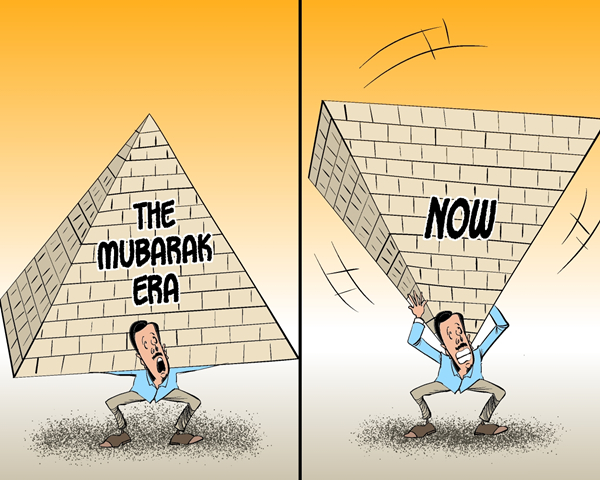A coup by any other name
- By Zhao Jinglun
 0 Comment(s)
0 Comment(s) Print
Print E-mail China.org.cn, July 5, 2013
E-mail China.org.cn, July 5, 2013
In scenes reminiscent of a military coup, armored military vehicles rolled through Cairo streets, surrounded the presidential palace and ringed the besieged president's Muslim Brotherhood supporters. Egypt's defense chief, General Abdul-Fattah el-Sisi, announced that Mohamed Morsi was no longer president, the Constitution was suspended and an interim government was installed, presided over by Adli Mansour, the new Chief Justice of the Supreme Constitutional Court.
|
|
|
Nothing changed [By Jiao Haiyang/China.org.cn] |
Egypt's first democratically elected president, his entire cabinet and key supporters are now in military custody. Some experts argue that the new interim president may only be a figurehead. The country is again under military rule.
The military has always been a potent force in Egyptian society. Hosni Mubarak, who ruled Egypt for nearly three decades, was himself a former air force commander who, in 2011, was ousted by his defense minister Field Marshall Mohamed Hussein Tantawi, known as "Mubarak's poodle." The military subsequently ran Egypt for more than a year.
Six decades ago, Egypt's King Farouk was overthrown in a coup that led to the rise of Gamal Abdel Nasser, who at the time was a colonel in the Egyptian army.
Egypt has the largest standing military in the Arab world, with some 450,000 troops and it has always looked out for itself above all else and is bent on preserving its untouchable realm of privilege in the Egyptian state. It controls 40 percent of state enterprises and senior figures enrich themselves through government contracts and business deals. They live as a class apart, with their own local clubs, hotels, hospitals, parks and other benefits financed by the state. The military has never been a force for democracy.
Morsi and the Muslim Brotherhood believed they had tamed the military after forcing out the top generals and reaching a deal with their successors. This was, however, a fatal miscalculation. Morsi granted two key demands: No prosecution of military officials for Mubarak-era crimes, and the exemption from parliamentary oversight of the military budget.
In a way, Morsi brought the coup upon himself, not only by "rearing a tiger that invited disaster" as the Chinese saying goes, but also as a result of his power grab and divisive rule which split the country in two. He also severed diplomatic relations with Syria for no good reason other than the fact that some Muslim clerics called for jihad in Syria. He also did it to please America.
The military supposedly has a road map to restore civilian rule. When al-Sisi made the announcement which made public Morsi ousting, he was flanked by Egypt's top Muslim and Christian clerics, as well as a number of political leaders, including Mohamed ElBaradi, the former Director General of the International Atomic Energy Agency; and liberal secularists celebrated Morsi's downfall.
But their celebrations may be premature, with analysts expressing the belief that the opposition was na?ve to cheer the military's return to power. Mr. Cook of the Council on Foreign Relations said: "The liberals and the revolutionaries are too quick to hop in bed with the military -- it is not their friend." He added: "The most important thing from the military's perspective is preserving its place as the locus of power and influence in the system."
President Obama said he was deeply concerned about the military overthrow of Egypt's first elected president. But he avoided calling the ouster a military coup, as this would trigger automatic cuts in U.S. aid to a longtime ally.
It is hard to believe that the Egyptian military would act without at least the tacit consent of the United States. After all, it was the Pentagon which largely built the modern Egyptian armed forces. Washington provides $1.3 billion in annual military assistance to Egypt. Al-Sisi himself is a U.S. Army War College in Pennsylvania alumnus. More than 500 Egyptian military officers train in America every year and as many suspect, the Egyptian army may be one of the U.S. government's best friends in the entire Arab world.
The author is a columnist with China.org.cn. For more information please visit:
http://www.china.org.cn/opinion/zhaojinglun.htm
Opinion articles reflect the views of their authors, not necessarily those of China.org.cn.







Go to Forum >>0 Comment(s)